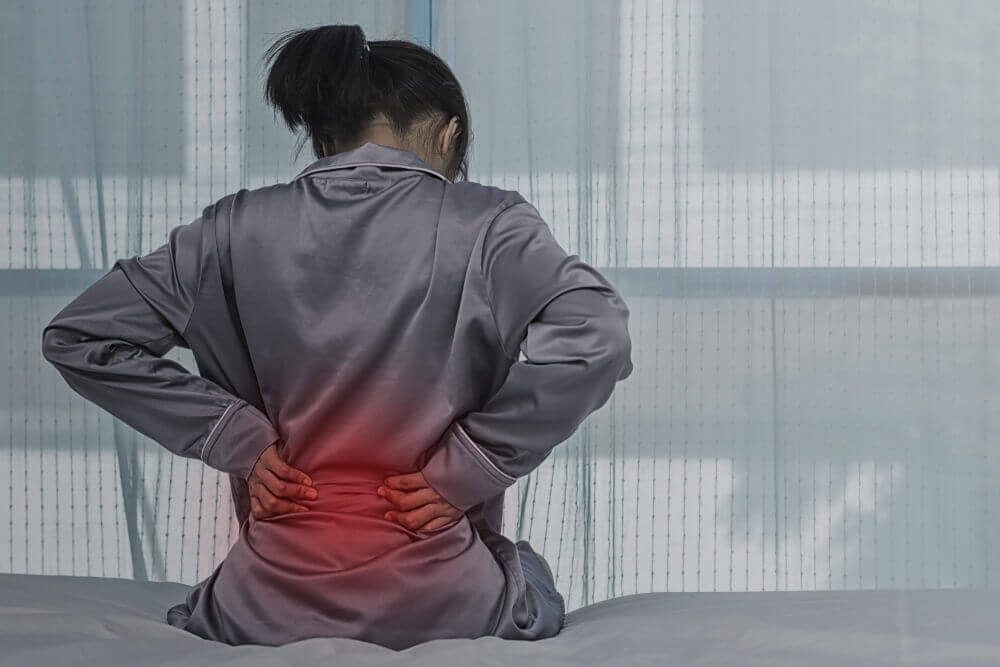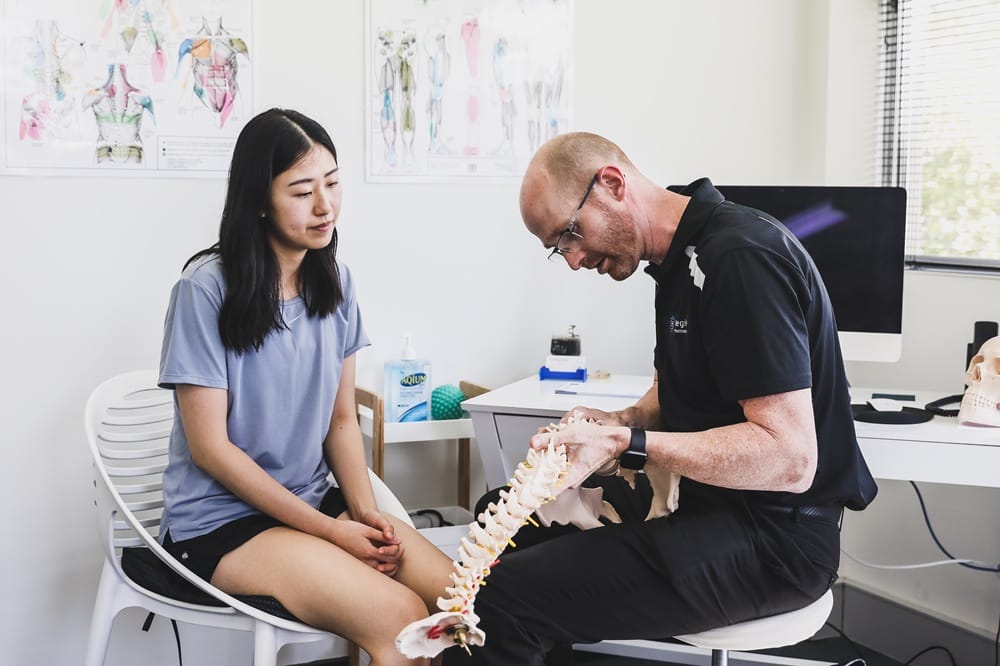
If you’re experiencing pain in your lower back this can be both debilitating and highly frustrating. It’s one of the most common injuries keeping people from work. Many people become frustrated from their pain and it can even affect their mental health. Lower back or ‘lumbar region’ pain can be caused by any number of reasons. You’ll recognise some of the following symptoms:
- Dull pain in your lower back
- Pain that shoots down into your legs when you walk
- Decreased flexibility and pain when lifting or bending over
- Pain when trying to stand up straight
While these symptoms are the most common, the following may indicate a more serious problem:
- Intense numbness or weakness in your leg or groin region
- Discolouration of the lower limb/s
- Pain in the abdominal region
- Loss of bladder or bowel control
- Lower back pain accompanied by a fever and/or sudden weight loss
Causes Of Lower Back Pain
A common injury like lower back pain can be the result of many different things. You may not even be aware of what started it. Sometimes lower back pain is the result of repetitive behaviours or simple things like carrying a heavy bag too long. Often lower back pain will self resolve, but if it’s lasting longer than a few weeks it’s worth getting some help. These injuries sometimes take time to manifest but can be equally as debilitating to recover from if left too long.
Work And Play: Muscle Strains And Lower Back Pain
Muscle strains are a typical cause of lower back pain and can be as simple as lifting something awkwardly or even something too heavy for you. Overuse or repetitive activities can also negatively impact your lower back. A professional bowler or batsman can often suffer from lower back pain due to repetitive swinging or throwing motions during a cricket match for example.
Lifting heavy objects at work is also a common cause of lower back pain. Taking the time to work if the object being lifted is too much for your level of condition is important. Also, you might not be lifting objects that are heavy but you must also determine your fitness level for the amount of lifting you are doing each day. Fatigue can lead to strains and sprains.
Is My Lower Back Injury More Serious?
Structural injuries to the lower back are somewhat more severe and can take longer to heal. In the lower back or lumbar region, there are five vertebrae known as L1-L5. These vertebrae make up the bottom of the spine and support the upper body. In between these vertebrae are what are commonly known as discs that cushion the spine’s movement and protect the vertebrae from rubbing against each other. These discs are what allow for our spinal flexibility and we owe much of our upper body movement to these structures. Changes in discs over time can sometimes cause pain but changes seen on imaging are usually no cause for concern.
If your lower back pain is due to a more serious structural issue your local Como physio can discuss this with you and make a plan for your recovery. Occasionally this will require referral to other practitioners but most back pain can be managed conservatively. Back injuries if managed well don’t have to develop into chronic conditions.
Will I Need Surgery?
Surgery is always the last resort but it is relevant for some cases where pain persists and treatments have failed across the board. Surgery may be necessary in cases of severe nerve damage as a result of musculoskeletal injuries. Surgery will always depend on the specific case or injury in question and determining success can take months. Conservative management is always the preferred approach.
Chronic Lower Back Pain
Usually, back pain is classified as chronic after 12 weeks of persistent pain following an initial injury. With 20% of people developing chronic symptoms following an acute injury, it’s best to get professional assistance as soon as you notice symptoms persisting. Getting help early will lower your risk of chronic pain in the future. Acting fast can have financial benefits too. Chronic pain can be a financial burden not only with increased medical bills but also with time spent away from work. Knowing where to turn for assistance in your recovery is very important.
Physiotherapy Exercises For Lower Back Pain
Qualified physiotherapists are your number one friend on the road to a full recovery. With experience in assisting people who are wishing to ease symptoms and get back on their feet, a physiotherapist for back pain can also assist in re-training muscles to be stronger and healthier over the long term. Booking yourself in to see a physiotherapist can assist you in getting the right exercise plan and tools to overcome pain, recover well and strengthen your lower back region. Having a personalised exercise plan will help alleviate immediate symptoms and work to build resilience in your lower back over the long term.
Get Your Lower Back On Track
With qualified advice from a physiotherapist, you’ll have increased chances of recovering fully from your injury and getting back into your routine. Reaching out to the experts is always a case of ‘the sooner the better.’ With an injury that keeps you in bed or away from your usual routine it’s often harder to get out of the house to see someone. Leaving an acute lower back injury unattended can sometimes have longer lasting consequences.
Make Your Recovery Targeted And Simple
If you’re starting your road to recovery from an acute lower back injury or wanting some tips on how to maintain your lower back strength – here are some targeted exercises that increase mobility and flexibility. Remember to take it slow, rushing or pushing yourself can be more detrimental than just resting, so ease off the weights, and don’t lift anything heavy. Follow the advice of your physiotherapist and allow yourself time and space to heal. If you’ve injured your lower back or are experiencing pain or loss of mobility get in contact with a professional today to maximise your chances of a quick recovery.




